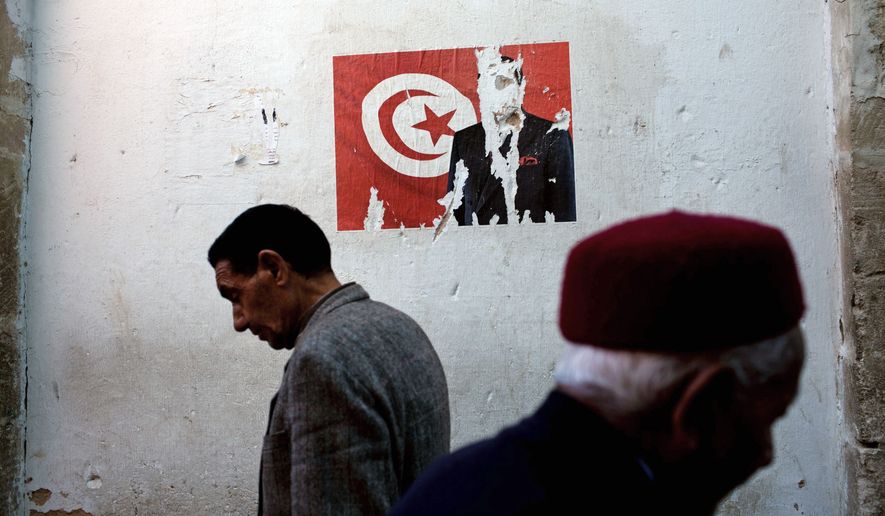TUNIS, Tunisia | Before starting to build the foundations of a new republic, Tunisians first rapidly demolished reminders of the old one. First to go were all pictures of ousted President Zine El Abidine Ben Ali lingering in offices, on billboards and on lampposts.
Buildings with purple facades or violet stenciling on them in honor of the former leader’s favorite color were repainted - white.
And the number 7 - Mr. Ben Ali’s lucky number - was removed from places such as the “Tele 7” television network and the Avenue du 7 Novembre.
More than two months after the popular uprising toppled Mr. Ben Ali, Tunisians say the revolution has galvanized the entire country, restoring their dignity and hope for a better future.
But they also are learning that getting rid of a dictator and his physical traces was the easy part.
“For the first time in so many years, we can look at the West in the eyes and feel like equals,” said Fares Mabrouk, founder of the Arab Policy Institute, a new think tank based in Tunis that supports democratic change in the Middle East. “[Our problems now] are hard to address, hard to resolve.”
Tunisians face the challenge of building a democracy, now that the physical manifestations of a 23-year dictatorship have been erased and the brutal repression of human rights activists and all political opposition is over.
“During the first stage, everyone was against the dictator, but once they are gone, you have the different groups fighting not just about power but what system they want,” said Duke University political science professor Bruce Jentleson, who until recently served as a senior adviser to the State Department’s policy planning director.
“But building institutions for a democracy is going to take a long time. It’s not going to be a straight line - there are going to be ups and downs, twists and turns.”
That has started. Mostly nonviolent protests throughout the month of February in Tunis resulted in the resignation of interim Prime Minister Mohamed Ghannouchi, who had served under Mr. Ben Ali for decades, as well as other officials.
The Tunisian interim Cabinet, meanwhile, lifted the ban on political parties, including the Islamist party Ennahdha. The courts formally dissolved the former ruling party, the Democratic Constitution Rally (RCD) on March 9, on the grounds of corruption.
Now, new parties seem to pop up every day. No one seems to know how many there are exactly, but the government puts the number at more than 50.
“I wasn’t really joking when I said, ’Would you like my couch for your political party to hold your meetings?’ ” said Hatem Bourial, a Tunisian commentator and author. “I mean these days, I could create a political party in a week if I wanted to.”
Democracy-building is happening as the country is dealing with severe economic issues. In late January, credit-rating agency Fitch cut its 2011 growth forecast for Tunisia from 5 percent to 2 percent.
Tourism, which makes up almost 7 percent of the country’s GDP and employs hundreds of thousands of Tunisians, saw a dramatic fall in visitors.
Tunisia’s unemployment rate is officially 14 percent, but the percentage of college graduates without work is about double that, according to the International Monetary Fund.
Strikes in numerous sectors are plaguing the country.
Still, much has changed. People talk freely and are not scared anymore. The “president’s men” were arrested. The former first lady’s “Trabelsi” clan that fleeced the country is on the run or in jail. The first convictions in corruption cases have been handed out.
During a visit on March 17 in Tunis, Secretary of State Hillary Rodham Clinton insisted on the importance of transforming the revolution into concrete results.
“We know there is a list of steps that are more likely to increase the success of the reform efforts, and we hope to see that in the weeks and months ahead,” Mrs. Clinton said.
“The revolution created so many hopes, and now we have to translate those hopes into results, and that comes through economic and political reform.”
According to analysts, Tunisia is the Arab country most primed for democracy.
“Tunisia is mature enough to move to democracy,” said Addi Lahouari, a sociology professor at the Institute of Political Studies in Lyon, France.
“It is a small country with an economy that is doing pretty well. It has a strong middle class with a significant level of education.
“It has not seen the massive migration from rural areas like Algeria and Morocco and especially critical, the army has no political weight. All these conditions gives Tunisia the best chance of any Arab country to become a full-fledged democracy.”
Tunisia will hold its first free elections since its independence from France in 1956 on July 24 - people will choose delegates to a constitutional assembly that is tasked with drafting the new constitution and laying the foundation for Tunisia’s new democracy.
No one knows yet what form that might take - a parliamentary model, a presidential one or a combination of both.
Tunisians “may move toward really interesting hybrid models that are not strictly based on Western democratic ones,” said Mr. Jentleson. “And these may accomplish objectives for their countries more effectively than just transplanting our models.
“Regardless of what comes, the whole sense of freedom and dignity [Tunisians] have gained make it difficult to put the genie back into the bottle - they won’t go back to what they had.”
No one in Tunisia seems to disagree with that.
“[The dictator and his people] took advantage of us and humiliated us for years,” said Midhal Hamami, standing in front of a makeshift memorial to those who died here in Sidi Bouzid, the central Tunisian town where the revolution began. “Now we are a free people.”




Please read our comment policy before commenting.